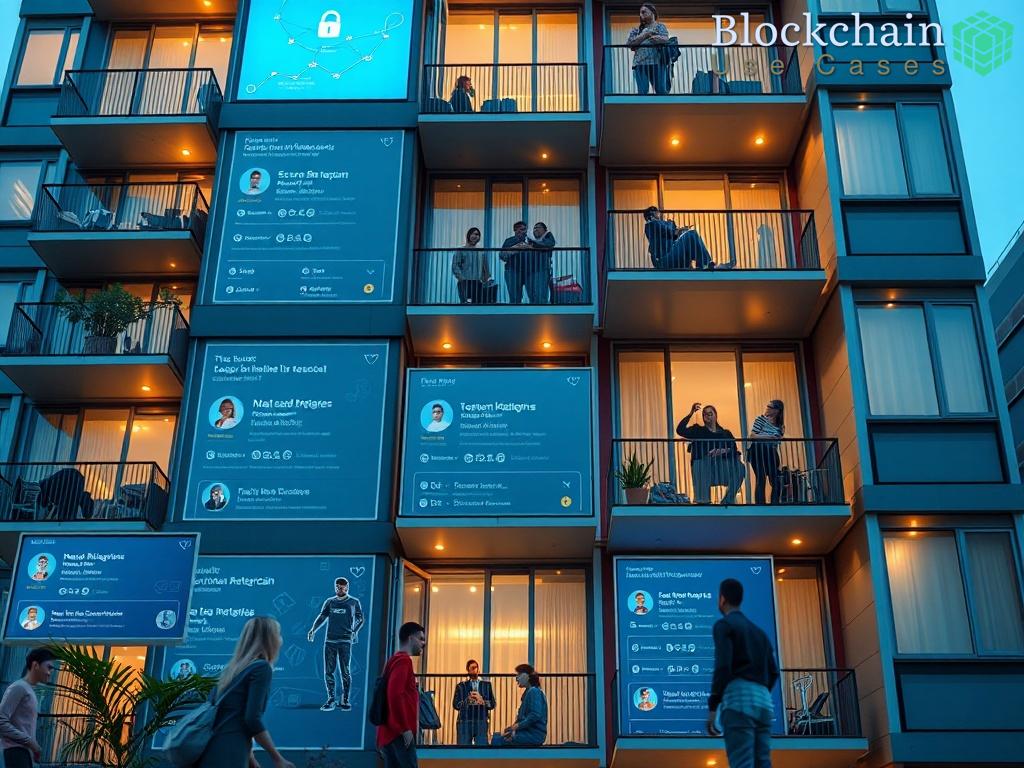Introduction to Blockchain Technology in Rental Management
In recent years, the rental market has undergone a significant transformation, driven by technology and the increasing demand for transparency and security. As landlords and tenants navigate this evolving landscape, traditional methods of managing rental histories and references have proven to be inefficient and prone to errors. Enter blockchain technology—a revolutionary solution poised to redefine the rental management ecosystem.
Blockchain technology offers a decentralized and immutable ledger that records transactions securely and transparently. This innovative approach not only enhances the integrity of rental histories but also fosters trust between landlords and tenants. By utilizing blockchain, stakeholders can access verified rental references and histories, reducing the risks associated with fraud and misinformation.
Here are some key advantages of incorporating blockchain in rental management:
- Transparency: All transactions are recorded on a public ledger, making it easy for landlords and tenants to verify rental histories.
- Improved Security: Blockchain’s cryptographic features protect sensitive information from unauthorized access and tampering.
- Decentralization: Eliminates the need for intermediaries, reducing costs and speeding up the rental process.
- Smart Contracts: Automated agreements that execute when predetermined conditions are met, ensuring compliance and reducing disputes.
To further illustrate the benefits of blockchain technology in rental management, the following table outlines a comparison of traditional rental management practices versus those enhanced by blockchain:
| Aspect | Traditional Method | Blockchain Method |
|---|---|---|
| Data Integrity | Prone to errors and manipulation | Immutable and verifiable records |
| Verification Time | Lengthy process requiring multiple confirmations | Instant access to verified histories |
| Cost of Management | Higher due to intermediaries | Reduced with direct peer-to-peer transactions |
| Dispute Resolution | Often lengthy and complicated | Automated through smart contracts |
The integration of blockchain technology in rental management not only streamlines processes but also empowers both landlords and tenants by providing a reliable framework for managing rental histories and references.
Benefits of Using Blockchain for Tenant References
As the rental landscape becomes increasingly competitive, landlords are seeking innovative solutions to establish trust and credibility with potential tenants. Blockchain technology emerges as a powerful tool that not only enhances the quality of tenant references but also revolutionizes the overall rental experience. This section delves into the transformative benefits of using blockchain for managing tenant references effectively.
The verification of tenant references has traditionally been a cumbersome process, fraught with delays and uncertainties. Blockchain technology simplifies this process by allowing verified records to be stored on a decentralized ledger, accessible to all relevant parties. This shift significantly shortens the time required to obtain reliable references, enabling landlords to make informed decisions swiftly.
One of the standout features of blockchain is its immutable nature. Once data is recorded on the blockchain, it cannot be altered or deleted, ensuring that tenant histories remain intact and reliable. This transparency fosters a higher level of trust between landlords and tenants, as both parties can rely on the authenticity of the information available.
Utilizing blockchain for tenant references not only streamlines operations but also significantly reduces associated costs. By eliminating the need for intermediaries, landlords can save on administrative expenses while simultaneously minimizing the risk of fraud. The decentralized nature of blockchain ensures that data is secure and tamper-proof, providing peace of mind to both landlords and tenants.
Below is a summary table illustrating the key benefits of employing blockchain technology in managing tenant references:
| Benefit | Traditional Method | Blockchain Method |
|---|---|---|
| Verification Time | Lengthy and complex | Instant access to verified records |
| Data Integrity | Susceptible to manipulation | Immutable and secure |
| Cost of Management | Higher due to intermediaries | Reduced with direct transactions |
| Trust Level | Variable and uncertain | High due to verified records |
Ensuring Data Privacy and Security in Rental Histories
In an era where data breaches and privacy concerns dominate headlines, ensuring the security of tenant rental histories is paramount. Blockchain technology emerges as a formidable ally in this quest, not only safeguarding sensitive information but also empowering individuals with control over their data. As the rental industry adopts blockchain solutions, it becomes imperative to explore how this technology can effectively maintain data privacy while enhancing overall security.
Data privacy in rental histories hinges on advanced encryption techniques that protect sensitive information at every stage. Blockchain employs cryptographic algorithms that secure data from unauthorized access and tampering. When tenant histories are stored on a blockchain, they are encrypted, ensuring that only authorized parties can view specific information. This level of security creates a formidable barrier against potential data breaches, elevating the confidence of both landlords and tenants.
One of the most significant advantages of blockchain is its decentralized nature, which grants individuals greater control over their data. Unlike traditional systems where data is stored in a central server, blockchain disperses information across a network of nodes. This means that tenants can manage who has access to their rental histories and references, allowing them to share their information selectively. By decentralizing control, blockchain mitigates the risk of data misuse and enhances overall privacy.
To further illustrate the multifaceted benefits of blockchain in ensuring data privacy and security in rental histories, consider the following aspects:
- Transparency with Anonymity: Blockchain can provide transparency in rental transactions without compromising tenant identities, as data can be anonymized while still allowing verification.
- Audit Trails: Every transaction recorded on the blockchain creates an immutable audit trail, which can be invaluable in tracking unauthorized access or changes to rental histories.
- Smart Contract Functionality: Smart contracts can automate agreements, ensuring that rental references are shared only when both parties consent, thereby reinforcing confidentiality.
As the rental management landscape continues to evolve, the integration of blockchain technology stands out as a transformative solution that prioritizes data privacy and security. By leveraging robust encryption, decentralized control, and a comprehensive approach to transparency, blockchain is poised to redefine how rental histories are managed, ultimately fostering a safer and more trustworthy rental environment.
Challenges and Limitations of Blockchain Implementation
The adoption of blockchain technology in the management of tenant rental histories and references offers numerous advantages, yet it is not without its challenges. Understanding these hurdles is crucial for stakeholders looking to leverage blockchain effectively. This section delves into the complexities that arise during the implementation of blockchain in rental management, highlighting the hurdles that must be addressed for successful integration.
One of the primary challenges in implementing blockchain technology within rental management systems is the technical sophistication required. Many existing platforms are built on traditional databases, making the transition to a blockchain-based system both complicated and costly. This shift demands significant investment in technology upgrades and staff training, creating a barrier for smaller rental agencies and landlords who may lack the resources.
Additionally, achieving interoperability between various blockchain systems and existing software solutions poses another technical hurdle. The fragmented nature of blockchain applications can create challenges in data exchange and usability across different platforms.
As blockchain technology continues to evolve, so does the regulatory landscape surrounding it. Landlords and tenants alike must navigate a maze of compliance requirements that can vary significantly by jurisdiction. This uncertainty can deter stakeholders from adopting blockchain solutions, as they may fear potential legal repercussions or the need for continuous adjustments to meet evolving regulations.
Moreover, the lack of clear guidelines on data ownership and privacy in blockchain implementations further complicates matters. Stakeholders must remain vigilant and proactive in understanding and adhering to the legal frameworks that govern data management in their respective regions.
Even with the technical and regulatory challenges addressed, the successful implementation of blockchain technology hinges on user adoption. Both landlords and tenants must comprehend the benefits of blockchain to fully embrace the transition. This necessitates comprehensive educational initiatives aimed at demystifying the technology and illustrating its practical advantages.
To facilitate understanding, the following list outlines key areas of focus for educational programs:
- Understanding Blockchain Basics: Educating users about how blockchain works and its benefits in rental management.
- Privacy and Security Features: Highlighting the encryption and data control measures that ensure tenant information remains secure.
- Practical Use Cases: Showcasing real-world examples of successful blockchain implementations in rental management.
- Regulatory Compliance: Providing insights on navigating the legal landscape associated with blockchain technology.
While blockchain technology offers transformative potential for secure management of tenant rental histories and references, the challenges of implementation must be carefully navigated. By addressing technical barriers, regulatory uncertainties, and fostering user education, stakeholders can pave the way for a more resilient rental management landscape.
Future Trends in Blockchain for Real Estate Rentals
The landscape of rental management is on the brink of a technological revolution, ushered in by the increased adoption of blockchain solutions. As stakeholders in the real estate sector become more aware of the benefits offered by this innovative technology, it is essential to explore the future trends that will shape the security and efficiency of tenant rental histories and references. This transformative potential promises to redefine interactions between landlords and tenants, creating a more trustworthy and streamlined rental experience.
One of the most exciting prospects for blockchain in rental management is the evolution of smart contracts. These self-executing contracts are poised to become more sophisticated, allowing for customizable rental agreements that cater to the unique needs of both landlords and tenants. Future developments may include:
- Dynamic Agreements: Smart contracts that adapt terms based on real-time data, such as market conditions or tenant behavior.
- Automated Compliance Checks: Built-in mechanisms to ensure that all parties adhere to rental regulations and agreements without manual oversight.
- Multi-Party Transactions: Enabling seamless interactions between multiple stakeholders—such as property managers, maintenance services, and financial institutions—via a unified contract framework.
As concerns over data privacy and security grow, decentralized identity solutions are expected to gain traction within the rental industry. This advancement will empower tenants with greater control over their personal information, allowing them to share verified rental histories selectively. Key features of this trend include:
- Self-Sovereign Identity: Tenants will have the ability to manage their identity and rental history data, sharing only what is necessary for potential landlords.
- Enhanced Verification Processes: Landlords can access authentic rental histories through secure channels, reducing the risk of fraud while respecting tenant privacy.
- Interoperability with Other Platforms: Integration with existing rental platforms, allowing for a seamless transition between traditional and blockchain-based systems.
The convergence of artificial intelligence (AI) and blockchain technology is set to revolutionize rental management practices. By harnessing AI capabilities, blockchain can enhance decision-making processes and predictive analytics. Future implementations may include:
- Predictive Analytics: Leveraging data to forecast rental market trends, enabling landlords to make informed pricing and investment decisions.
- Automated Tenant Screening: AI-driven algorithms can analyze tenant applications and histories stored on the blockchain, providing landlords with deeper insights into prospective renters.
- Fraud Detection Systems: Machine learning models that monitor blockchain transactions for signs of fraudulent activity, ensuring a secure rental environment.
As the real estate rental sector evolves, embracing these future trends will be essential for stakeholders seeking to harness the full potential of blockchain technology. The integration of enhanced smart contracts, decentralized identity solutions, and AI promises to create a more secure and efficient rental management landscape, ultimately fostering stronger relationships between landlords and tenants.


















